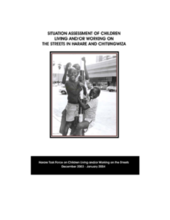A significant proportion of children in Zimbabwe live in weakened families and communities where social support is diminishing, impoverishment increasing, and access to health, education and social services are on the decline. Abuse (physical, emotional and sexual), economic exploitation (child labour), lack of parental care, street life and institutionalisation are some of the conditions that aptly describe or serve as evidence to the vulnerable state of these children. Generally, the prevailing negative macro-economic environment results in a child unfriendly environment that threatens both the survival and development of children.
As part of the process of developing a comprehensive National Strategy for Children Living and/or Working on the Streets, the Zimbabwe National Council for the Welfare of Children, in collaboration with the Harare Task Force on Children Living and/or Working on the Streets and UNICEF Zimbabwe, undertook a study aimed at compiling a comprehensive information base on the plight of children living and/or working on the streets of Harare and Chitungwiza.
This assessment was carried out by the Harare Task Force of the Network of Organisations Working with Children Living and/or Working on the Streets, a group of NGOs and other organisations concerned with the welfare of children, and financial assistance from UNICEF. The objectives of the situation analysis were:
· To find out why the children are on the streets;
· To gather information on the family background of these street children;
· To identify the problems that these children face on the streets; and
· To formulate and implement appropriate interventions
The findings support that programmes for street children are best directed at the general public and those charged to enforce the law to address negative attitudes and violent practices against street children. Research has demonstrated that no amount of intervention programming designed for street children can be successful unless the community is prepared to respect, protect and provide opportunities to street children. Interviews with street child-care workers revealed that all programmes for street children, be they government run or supported by NGOs, lack adequate funding and skilled personnel, and suffer problems with co-ordination between similar organisations. The study confirmed that street children continue to be treated negatively by the general public and law enforcement agents. Street children are seen as ‘vagrants’, ‘illegal vendors’, ‘thugs’ or ‘truants’ by both the law and the public as a whole. Focus group discussions confirmed that many people view street children as irresponsible youth who are criminals in the making.
A growing disquiet exists over the numbers of children working and living on the streets. These children have been portrayed, especially in the electronic and print media, as little thieves or criminals in the making. Their moral behaviour is seen as different from other children who are not on the street. The study found that street children do not enjoy being on the streets and believe continued life on the streets presents a bleak outlook, offering no hope for a future. They in fact requested assistance to improve their situation. Specifically, they requested government’s intervention, believing they have a right to such a demand as they too ‘are citizens of this nation. Most of the children left home to look for ways to earn an income or because of poverty at home (35%). It is, however, important to understand that poverty is not the main reason why children resort to the streets. Poverty alone will usually not make a child prefer the street to his/her home. The immediate causes in fact ranged from abuse (sexual or physical), death/abandonment by guardian/parent, to family breakdown.

